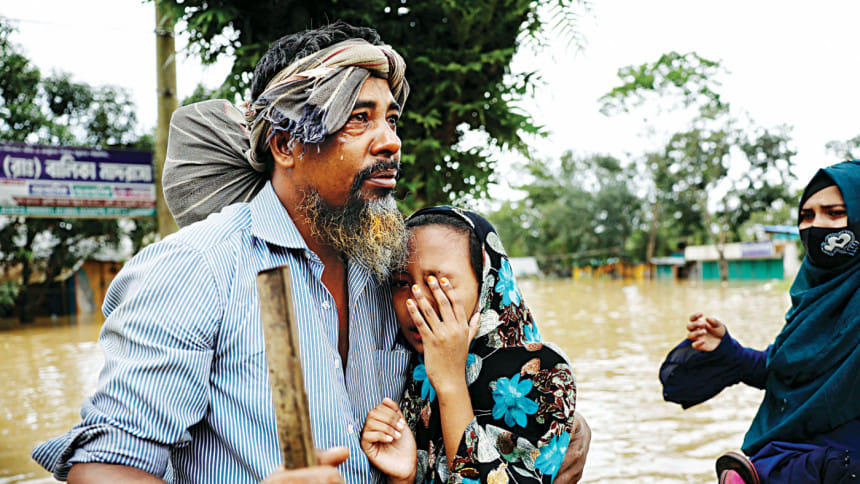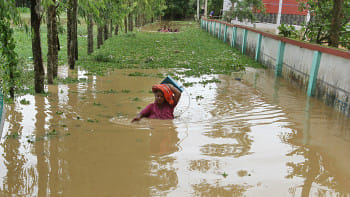Flash floods: ‘We had no clue what was coming’

When Tuhin Rana, a private company employee in Dhaka, heard last week that floodwaters were entering his remote village in Noakhali, he called his parents and wife who had just given birth and told them to stay safe.
Tuhin thought his family members, natives of the coastal region, would know how to cope with the disaster.
But on Thursday, he found their phones unreachable and read about the devastation the floods were causing.
Yesterday, Tuhin reached his home after nearly an 18-hour journey, which usual took five hours, because the roads were flooded and he had to wait for hours to find boats.
"I found my elderly parents sitting on the bed of our hut to stay dry. They had not eaten cooked food in two days. My wife and newborn were taken to a safer place by the neighbours. There is still one-feet deep water in the house," he told this correspondent.
"They are drinking unsafe water. Water in the hand pumps is not clean. I am feeling helpless. They had no idea what was coming."
Most residents of the area took shelter at Batakandi Model School and College. But they also do not have enough food, water and sanitation, locals said.
Some people set up kitchens and provided food. But they ran out of money. Due to the lack of boats in the area, barely any relief materials reach us.
"Some people set up kitchens and provided food. But they ran out of money. Due to the lack of boats in the area, barely any relief materials reach here."
Tuhin's family members are among millions in Noakhali, Feni, and Cumilla districts who have been suffering for the past four days.
In Noakhali, eight upazilas were still flooded. Due to a bout of downpour yesterday, the situation worsened.
In Feni, several remote upazilas remained inaccessible by road, even as waters were receding. Mobile networks have not yet been fully restored, and many areas are still without electricity.
Locals said there is now a severe shortage of drinking water and food.
Meanwhile, three new deaths -- one each in Noakhali, Cumilla, and Rangamati -- were reported yesterday, taking the toll from the floods to 21. Two people were reported missing in Moulvibazar.
People started returning to their villages in Brahmanbaria, Lakshmipur, Sylhet, Moulvibazar, Habiganj, Khagrachhari, Chattogram, and Cox's Bazar as the flood situation was improving there.
Many huts have collapsed and thousands have lost almost all their belongings, including farm animals and stored crops.
According to the disaster management ministry, the floods marooned over 10 lakh people in 11 districts and the total number of those directly affected was over 52 lakh.
At least 73 upazilas have been severely impacted. The authorities opened 3,654 shelters, providing refuge to over 4 lakh people.
MISERABLE CONDITION
Yunus Sikder, a resident of the Bangla Bazar area in Begumganj, Noakhali, said thousands were suffering from a shortage of food.
"I spent all my savings on food and water. Now we are forced to drink dirty water," he said.
Although the water has been receding, the situation remains particularly dire in Feni and Cumilla, where relief materials have not reached many remote areas because trucks broke down on flooded roads, and there is no boat to carry them.
People stranded in Cumilla were also suffering from shortage of food and drinking water.
In some places of Feni, helicopters of the army, navy, air force, RAB, and BGB are delivering relief goods to remote areas.
The floods have caused extensive damage to fish farms and livestock, with losses estimated at Tk 411 crore, according to the government.
[Anwarul Haider from Noakhali, and Khalid Bin Nazrul from Cumilla contributed to this report.]

 For all latest news, follow The Daily Star's Google News channel.
For all latest news, follow The Daily Star's Google News channel. 





Comments